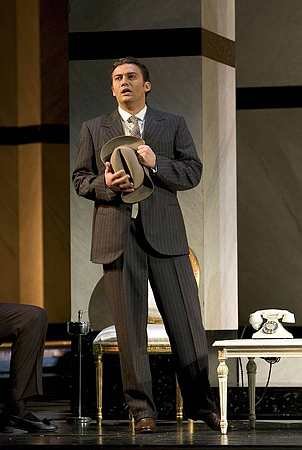|
|
|
|
|
|
|
|
| The Telegraph, 16 November
2004 |
| Rupert Christiansen |
Puccini: La Rondine, ROH, London November 2004
|
The real Gheorghiu?
|
| Rupert Christiansen reviews La rondine at the
Royal Opera House |
|
 After two seasons perched in the balcony of the
Royal Opera House, I have now transferred to the front stalls. It makes a
significant difference, not only because I'm now that much closer to the
details, but also because the acoustics aren't nearly so flattering down
below. The balance favours the orchestra, and voices sound harder and less
resonant. After two seasons perched in the balcony of the
Royal Opera House, I have now transferred to the front stalls. It makes a
significant difference, not only because I'm now that much closer to the
details, but also because the acoustics aren't nearly so flattering down
below. The balance favours the orchestra, and voices sound harder and less
resonant.
So where did I hear the real Angela Gheorghiu? In the balcony for Simon
Boccanegra and Faust earlier this year, I had found her dark-hued,
deep-plush soprano as wonderfully seductive as it sounds on her carefully
engineered recordings.
Up close and personal for this revival of Puccini's La rondine, it seemed
much thinner and slighter in timbre, especially in the middle register. (I
certainly can't imagine how she will cope "live" with Madama Butterfly or
Tosca, said to be on her schedule.)
Both her vocal and dramatic characterisation of the fragile, guilt-racked
Magda seemed too full of diva-ish self-regard: she stood there happily
radiating her own loveliness, but didn't project anything else much.
Although some spine-tinglingly gorgeous noises emerged – she is mistress of
the sudden float – there was no relish or colouring of the line, and her
opening aria "Che il bel sogno" crucially failed to charm. Another thing you
notice up close is how reliant she is on the prompt box.
This was none the less an enjoyable performance. Gheorghiu is a star, after
all, with a voice and appearance of rare beauty, and she was strongly
partnered by the Ruggero of Jonas Kaufmann, making a welcome Covent Garden
debut. This personable German lyric tenor may not be a natural for this
repertory, but he sings with great elegance and musicality, and is evidently
as turned on by the heavenly Act 2 brindisi as I am.
Kurt Streit and Annamaria dell'Oste brought zip to the comic relief, and the
chorus sang magnificently in the Café Bullier scene. Emmanuel Villaume's
conducting emphasised the score's boulevard skittishness rather than its
romantic melancholy – more Messager than Puccini in style, I thought.
Nicolas Joel's production remains perfectly serviceable, magnificently
framed by Franca Squarciapino and Ezio Frigerio's designs. The stained-glass
Art Nouveau conservatory of Act 3 provoked spontaneous applause, and, even
if we didn't exactly come out humming the sets – Puccini is too good a
composer for that – we certainly got an eyeful. |
|
|
|
|
|
|
|
|
|
|
|
|
|
|
|
|
|
|